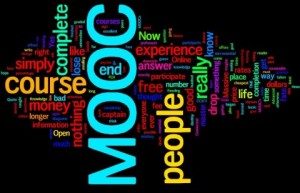 Assume that someone you know wants to become a coach. He or she finds the best coach training program available and enrolls for all of the courses. Instead of paying the $2000 or more that such courses usually cost, the potential coach takes all of the courses for free on the Internet. Unlikely? Not in the world of Massive Online Open Courses, best known as MOOCs.
Assume that someone you know wants to become a coach. He or she finds the best coach training program available and enrolls for all of the courses. Instead of paying the $2000 or more that such courses usually cost, the potential coach takes all of the courses for free on the Internet. Unlikely? Not in the world of Massive Online Open Courses, best known as MOOCs.
If you work in higher education probably you’re familiar with MOOCs. Harvard, Stanford and MIT are among the institutions that post most, if not all of their courses online for any who want to enroll. A Time cover story (October 7, 2013) reports that the MIT courses have enrolled 150 million learners worldwide. Harvard has reached 1.25 million since their MOOC initiative began 17 months ago. Time argues that well-designed online courses are better than traditional on-campus lecture courses. I know from experience that interactive online courses, even those that charge tuition, can create better learning experiences for students. If done well they also are more demanding both on students and teachers. An educator-blogger in India suggests that MOOCs could change the world of education and impact billions of people. And what applies to university courses applies as well to professional training and other forms of education.
Of course online education works best at transferring information. Face-to-face interaction has something that online education cannot duplicate. Skills learning (like learning counseling, coaching or leadership skills) can’t always be taught well online. “For all the strengths of today’s digital technologies, some things are transmitted most effectively face-to-face. [These include] …the judgment, confidence, humility and skill in negotiation [and counseling] that come from hands on problem solving and teamwork; the perseverance, analytical skill and initiative that grow from conducting frontline lab research; the skill in writing and public speaking that comes from exploring ideas with mentors and peers.” Critics note that over 95% of those who enroll in MOOCs or other non-interactive online courses never complete them.
Nevertheless, the time has come to move from on-campus or online teaching that is limited to lecture talks, boring (often outdated) video lectures, or grueling modular courses. Changes like these can be disruptive but also exciting. Do you agree? Please comment.
You are SO great at getting me to think, to pause and reflect, and to “goose” me to maybe take some action.
Thanks for being a great friend and a great influence in encouraging me to be a more effective servant.
Gary
Gary J. Oliver, Th.M., Ph.D.
Executive Director
The Center for Relationship Enrichment
Professor of Psychology & Practical Theology
John Brown University
2000 West University Street
Siloam Springs, AR 72761
(479) 524-7105
[cid:image001.jpg@01CEC590.23978C60]
Celebrating 14 Years of Ministry
to Northwest Arkansas and
Around the World
Thanks Gary. You have been a big encourager for me since we first me. I appreciate this; I appreciate you.
I agree with how education is trending towards giving lectures away especially to third world countries. I agree that interaction, cohorts and mentors are a vital part of online education. Biblicaltraining.org is one of those siites that offer seminary education with the top professors in the world and they are free.
Bill and Robin,
You know this but it needs to be reinforced. You are at the cutting edge of free online education, of top quality, even before most of us ever heard of MOOCs. Thanks for being leaders here.
Absolutely. It is time the academy gets past its entrenched attitude that one on fifty is the best form of education.
Good piece. I would argue that sheer information transmission is much superior via pure one-way communication as with online courses or recordings. Capabilities of going at best learning time and at own pace; pause, repeat, volume control; reduction of distraction; focus on consuming data first with processing etc. following later: these I suspect are key benefits.
In my experience the superior potential for skill and judgment etc building in face-to-face settings is often squandered by clunky, lazy, or haphazard construction of the actual sessions and/or material. You can’t think like a lecturer, write a few “I am looking for a specific answer” or “share your uninformed opinion” questions, and break into groups of mutually puzzled non-experts who came because they don’t have skills but want to learn them from an expert– and expect to realize the potential of face-to-face. However, a pedagogically saavy face-to-face can be transformational. Socratic method + deeply considered study/discussion questions + “let’s practice this skill under watchful eye of expert” breakout groups: these experiences can rapidly build real competence even in complete novices.
You are right on target. Thanks for your comment.
In several ways this sounds like a great idea. But who pays for the instruction (including institutional costs), and how?
Hi Roger. I teach at a large Christian school that is considering MOOCs. When students want academic credit, transcripts, interactive classroom activities, contact with the professor and things like that there is a cost. But as I understand this it is far less costly for students even when they pay some fees and much cheaper for academic institutions that have little hope of surviving if they charge huge fees and operating costs to have students on campus. I think that survival is at stake for a lot of academic institutions and even professors. You and I are old enough that we probably will avoid the brunt of these changes.